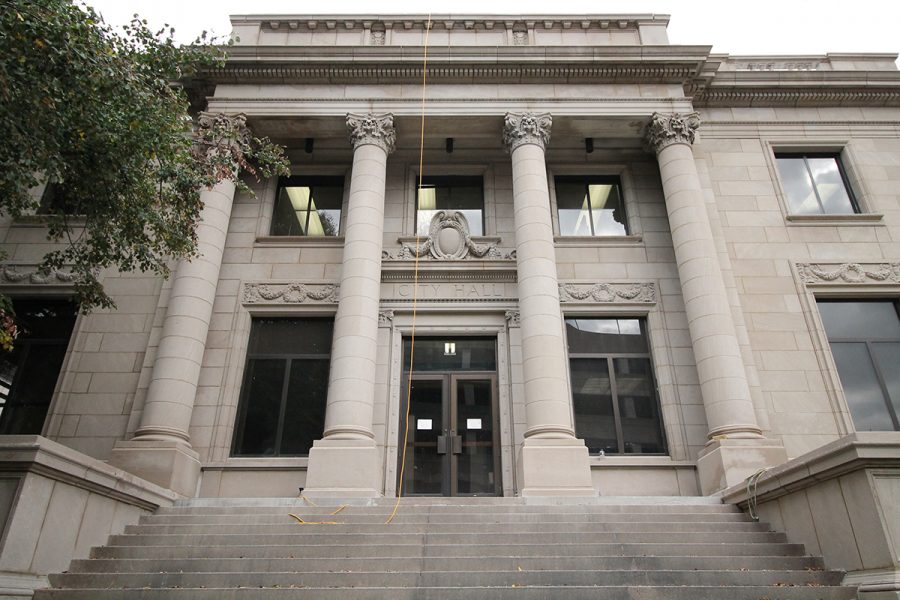City Council rules to replace Columbus Day with Indigenous Peoples’ Day
The second Monday of October in Eau Claire will honor America’s indigenous population
More stories from Alyssa Anderson
Photo by Sam Farley
On Tuesday, Oct. 10, the Eau Claire City Council officially replaced Columbus Day with Indigenous Peoples’ Day.
In 1492, Columbus sailed the ocean blue. And, according to BBC History, the Italian explorer American students are taught to revere did not even sail in the right direction.
On Oct. 10, the Eau Claire City Council ruled 9-2 in favor of a resolution replacing Columbus Day with Indigenous Peoples’ Day. This ruling followed Monday’s meeting at which community members, including UW-Eau Claire student Mack Yagilashek, spoke in favor of the new holiday.
Mack Yagilashek, a sophomore legal studies student, said he believes Indigenous Peoples’ Day is a chance for Americans to reflect on the country’s history of exploiting and colonizing its indigenous people.
“It’s more symbolic than anything,” Yagilashek said. “There’s not much it (Indigenous Peoples’ Day) can do to help Native American people, but it is a chance for people to realize that Native Americans are still being affected adversely because of our history with them.”
An article for Time Magazine said Columbus Day was first recognized in 1937 by President Franklin D. Roosevelt. By the early 1990s, cities like Berkeley, California began replacing Columbus Day with Indigenous Peoples’ Day, criticizing the celebration of Columbus’ “discovery” of a country that was already inhabited.
Loni Hancock, who was the Mayor of Berkeley in 1992, said they opted for the alternative to Columbus Day because the existing celebrations were “Eurocentric and (have) ignored the brutal realities of the colonization of indigenous peoples.”
Christopher Columbus set out on an expedition to discover unexplored parts of Asia, an article for BBC History stated. Instead of sailing to the Indies, Columbus ended up on the opposite side of the globe in the modern-day Bahamas. Here, he proceeded to mutilate and enslave the area’s native people known as the Tainos.
“They were very well built, with very handsome bodies and very good faces,” Columbus said in his diary. “They do not carry arms or know them … They should be good servants.”
It wasn’t long before a gold-obsessed Columbus forced the Tainos into slavery. Within decades, the Taino population was decimated by the European’s brutal treatment and infectious disease, the BBC said.
“I support Indigenous Peoples Day because Columbus raped, tortured and killed countless indigenous people,” said Morgan Hines-Munson, a 2015 graduate from the American Indian studies program at Eau Claire. “Immediately upon arrival, rape of indigenous women began. They were literally pulling women on the ships and raping them as soon as they hit land.”
Hines-Munson said Columbus’ arrival set off the violence against indigenous people, particularly women, that is still occurring today.
The rate of sexual violence against indigenous women is three times higher than any other demographic, Hines-Munson said. Violence against native women was normalized from the very first contact with Europeans. White, non-native men are the perpetrators almost 90 percent of the time when it comes to violence against native women.
“The absolute least we could do is honor and uphold indigenous people instead of honoring the man who annihilated them for his own gain,” Hines-Munson said.
As of Tuesday, Oct. 10, the city of Eau Claire will no longer honor the brutality of Christopher Columbus. Eau Claire has officially joined the dozens of cities choosing to respect indigenous people, instead of the man who initiated violence against them.
“Imagine if a nation had a day every year that celebrated the killings of Catholics everywhere, for example,” Yagilashek said. “I urge people to take a step in their (indigenous peoples’) shoes.”


